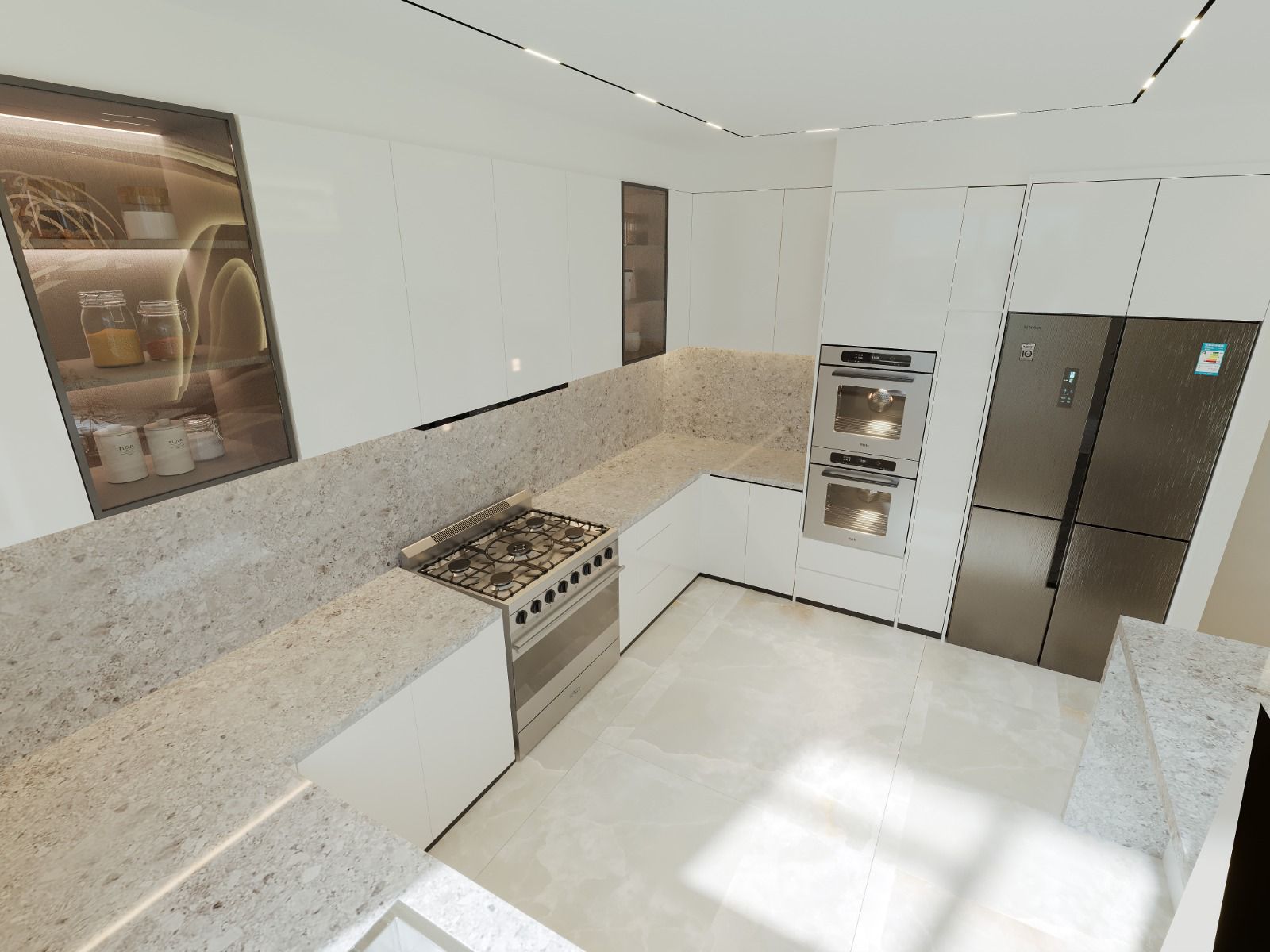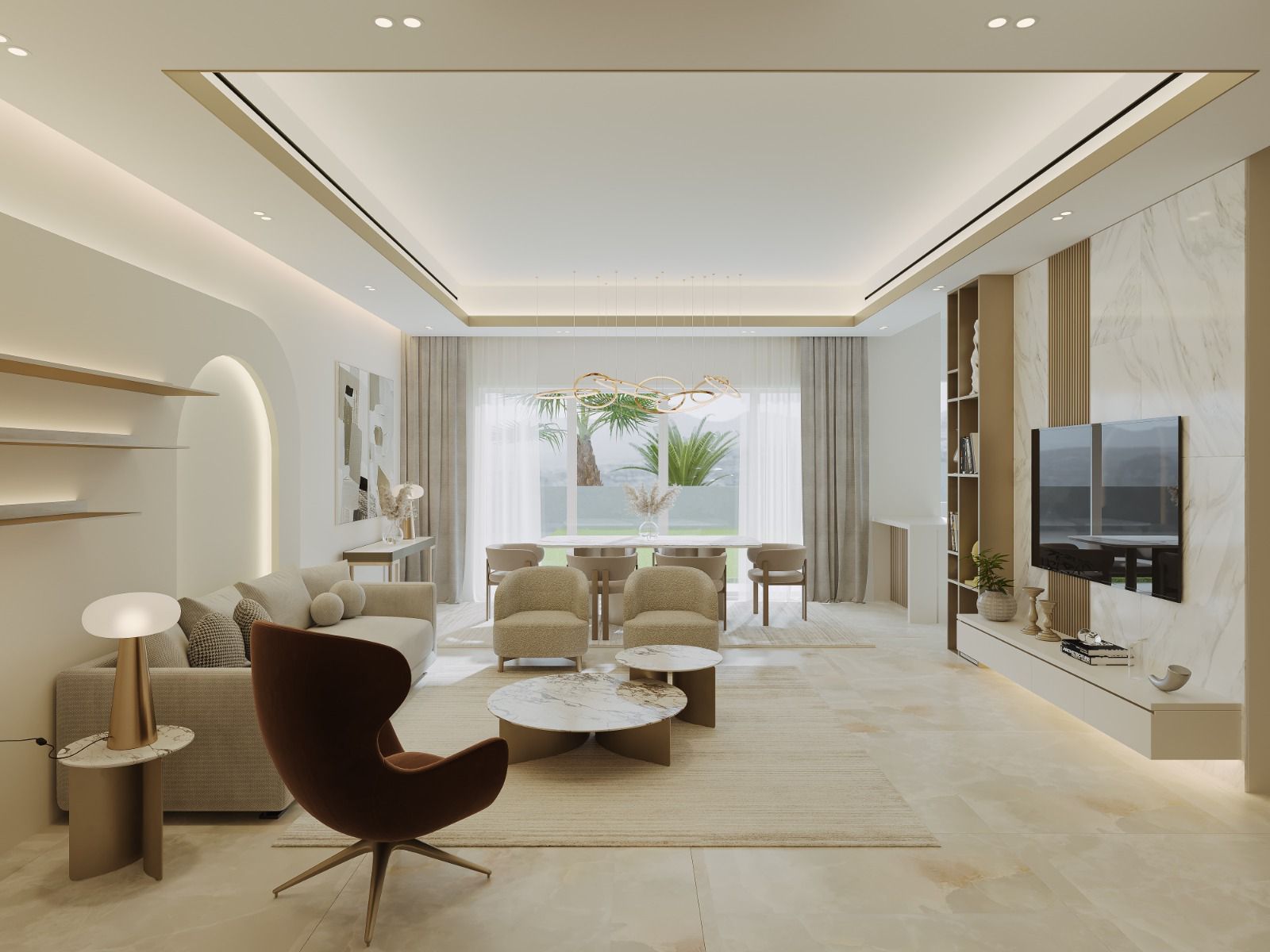Al Batal Al Saed Interior Decoration LLC
Al Qusais Industrial Area 1 - Dubai
Products & Services:
Interior Design, Ceiling Interior Design, Office Fit-Out, Villa Design, MEP Services, Custom Furnitu More..
Since : 2018
Al Qusais Industrial Area 1 - Dubai
Products & Services:
Interior Design, Ceiling Interior Design, Office Fit-Out, Villa Design, MEP Services, Custom Furnitu More..
Since : 2018
Modular kitchens have transformed the way we view cooking spaces, combining aesthetic appeal with exceptional functionality. The concept of modular kitchen design has become incredibly popular in Dubai, offering homeowners and businesses the opportunity to create personalized, organized, and modern kitchens.
A Modular Kitchen Designer is a professional who specializes in creating kitchens with modular components. These components are pre-manufactured in standard sizes and can be assembled to create custom kitchen layouts. The key advantage of modular kitchens is their flexibility and the ability to design them according to the user's specific needs. These kitchens consist of units like cabinets, countertops, shelves, and drawers, which can be customized in materials, finishes, and configurations. In Dubai, the demand for modular kitchen designs has risen exponentially as more people look for practical and aesthetically pleasing solutions to maximize space in their homes and apartments. These designers help clients select materials, styles, and layouts that work best for their space, ensuring efficiency and comfort. The emphasis is on creating functional spaces that don’t compromise on style.
1. Al Batal Al Saed Interior Decoration LLC
101, Shakhboot Building, Damascus Street, Opposite Emirats Building, Al Qusais Industrial Area 1, Dubai, 00
2. Design Studio
Business Bay, Dubai, United Arab Emirates
3. LWK & Partners
205, Jumeirah Business Centre, Al Wasl Road, Dubai, UAE
4. Interiors by Khamas
403, Al Nahda 2, Dubai, UAE
5. Fujairah Interior Design
Fujairah Business Center, Dubai, UAE
6. HBA (Hirsch Bedner Associates)
702, Marina Plaza, Dubai Marina, Dubai, UAE
7. Bishop Design
One JLT Tower, Jumeirah Lake Towers, Dubai, UAE
8. Architectural Digest Interiors
Downtown Dubai, UAE
9. Algedra Interior Design
Dubai Design District, Dubai, UAE
10. Vera Doble Design
Al Barsha, Dubai, UAE
Interior designers
are professionals who possess a unique combination of engineering expertise,
ingenuity, and a keen understanding of spatial configurations. They strive to
improve the aesthetics and functionality of the interiors of residential and
commercial spaces. Interior designers who are reputable work in conjunction
with clients to transform their visions into practical realities. While shaping
the visual appeal and functionality of the interior spaces, they adhere to
construction prerequisites, safety restrictions, and budgetary constraints.
Interior designers
are creative professionals who specialize in transforming indoor spaces into
functional, beautiful, and inspiring environments. Their work goes beyond mere
decoration; it involves space planning, color coordination, material selection,
lighting design, and understanding how people interact within a space. Whether
it's a cozy home, a modern office, or a luxurious hotel, interior designers
play a crucial role in shaping the atmosphere and functionality of interiors.
They begin by
analyzing the client’s lifestyle, preferences, and space requirements, followed
by creating detailed design concepts, mood boards, and 3D visualizations. Their
ability to blend aesthetics with practicality helps ensure that every inch of
space is used efficiently and purposefully. With expertise in trends, building
codes, and materials, interior designers bring a unique combination of artistry
and technical knowledge to every project.
🧩 Why Hiring an Interior Designer Makes a Difference
Hiring a
professional interior designer can dramatically improve the value, comfort, and
usability of a space. These experts understand how to balance textures, tones,
patterns, and proportions, creating a cohesive and visually pleasing
environment. They work closely with architects, contractors, and furniture
makers to ensure that the design vision is accurately executed.
Interior designers
also help clients save time and money by avoiding costly mistakes and
suggesting smart investments in quality furnishings and finishes. Their access
to exclusive resources, such as premium fabric houses, specialized contractors,
and high-end suppliers, often provides clients with better options and pricing.
Whether renovating a single room or designing an entire property from scratch,
their guidance ensures a stress-free and successful design journey.
In
today’s fast-paced world, interior spaces play a crucial role in enhancing
quality of life and productivity. Whether it’s your dream home or a commercial
office, a well-designed interior doesn't just look good—it functions
efficiently, elevates mood, and communicates a unique identity. That’s where Interior
Consulting Services come in.
Interior
consulting is more than just choosing paint colors or furniture—it’s a
professional approach to understanding your space, lifestyle, needs, and
translating it into practical and aesthetic design solutions. From initial
ideation to final execution guidance, these services help clients make informed
decisions while saving time and money.
What Are Interior Consulting Services?
Interior
consulting refers to expert guidance provided by interior designers or
consultants to improve or transform residential or commercial spaces. It
typically involves:
Unlike
full-scale design services, consulting focuses more on planning, ideas, and
expert opinions rather than managing every step of implementation. It’s ideal
for clients who want professional input but prefer to execute the work
independently or in phases.
Types of Spaces Served by Interior Consultants
1. Residential Interiors
Consulting
for homes involves making living spaces more functional, cozy, and aligned with
the homeowner’s tastes. This includes:
2. Commercial & Office Interiors
Businesses
and entrepreneurs seek interior consultants to create productive, brand-aligned
environments. This may cover:
3. Retail, Hospitality & Showrooms
From
cafes to clothing stores, consultants help create inviting, experiential spaces
that attract customers:
In the
world of interior design and architecture, the right materials and finishes
can make all the difference between a mediocre and a stunning space. While
layout and furniture set the foundation, it’s the material selection and
finishing touches that define the ambiance, durability, and overall appeal
of any environment.
This
process isn’t just about aesthetics—it directly impacts functionality,
maintenance, cost-effectiveness, and the lifespan of a project. Whether you're
designing a new home, office, or commercial outlet, professional consultation
for material selection and finishing ensures that you choose the best
elements suited to your style, climate, usage, and budget.
What is Material Selection and Finishing in Interior
Design?
Material
Selection refers
to the careful choice of surface materials used in a space—such as wall
finishes, flooring, ceilings, cabinetry, countertops, upholstery, and hardware.
Finishing refers to the treatments or
final touches applied to these materials—like paint, polish, texture,
laminates, veneers, and coatings—to enhance appearance, durability, or both.
The right
selection and combination of materials and finishes enhance:
Key Areas Where Material Selection Matters
1. Flooring
Choices
include tiles, wood, vinyl, marble, granite, concrete, or carpets. Each has
pros and cons related to durability, cost, and maintenance. High-traffic areas
like living rooms or offices need sturdy, low-maintenance materials, whereas
bedrooms can use softer finishes like wood or carpet.
2. Wall Finishes
Paint,
wallpapers, wood paneling, tiles, stone cladding, textured plasters, or even
exposed brick—walls offer unlimited opportunities to create style statements.
Moisture-prone areas like bathrooms and kitchens require water-resistant
finishes.
3. Ceilings
POP,
gypsum board, wood panels, PVC, or stretch fabric ceilings can dramatically
alter space perception. Finishes like matte, gloss, or texture affect lighting
and atmosphere.
4. Countertops and Surfaces
Used in
kitchens, bathrooms, and utility zones—materials like granite, quartz, solid
surfaces, or stainless steel are chosen for heat resistance, hygiene, and
durability.
5. Cabinetry and Woodwork
Here,
materials like MDF, plywood, particle board, laminates, acrylic, veneer, or
lacquered finishes come into play. Finishing impacts aesthetics, scratch
resistance, and moisture protection.
6. Hardware and Accessories
Handles,
knobs, channels, hinges, and frames are essential to usability and style.
Finishes include matte black, chrome, brass, antique bronze, etc.
1. What types of
services do interior designers offer?
Interior designers offer a diverse array of services, including the
conceptualization and organization of spaces, color advisory services,
furniture and material selection, lighting layout, construction supervision,
and more. Additionally, they offer services that specialize in the design of
newly constructed areas, the enhancement of functionality and aesthetics, and
the renovation of existing spaces.
2. Are interior designers available to provide assistance with space
optimization?
Indeed, interior design necessitates the optimization of layout and space
planning. The most effective arrangement of fixtures, furnishings, and
structural elements for optimal functionality and mobility is determined by the
evaluation of the available space by top interior designers.
3. In order to
achieve the best possible outcomes, do interior designers work in conjunction
with contractors and other professionals?
It is true that interior designers frequently collaborate with builders,
contractors, architects, engineers, and other professionals involved in the
development, renovation, or reconstruction project to ensure that the
construction or remodeling endeavor is executed seamlessly and achieves the
desired objective.
4. Are interior
designers involved in healthcare projects?
Indeed, interior designers may also offer their services to commercial
properties, the hospitality industry, hospitals, clinics, and other medical
facilities in addition to residential projects.
5. What is the
method by which interior designers determine the costs and fees affiliated with
their services?
The fee levied by reputable interior designers may be determined by the scale
and complexity of the project, the designer's expertise level and experience,
and the location's accessibility. Interior designers may charge a fixed price,
a percentage of the project cost (5% to 20%), or a combination of both for
their expertise services, depending on these factors.

Dubai, Al Qusais Industrial Area 1

Dubai, Al Qusais Industrial Area 1
Latest Customer Reviews
"We hired Al Batal Al Saed Interior Decoration for fit-out services, and we were very pleased with their work. The team was professional, skilled, and competitive in their pricing. Their attention to detail and commitment to quality were impressive. I highly recommend their services"